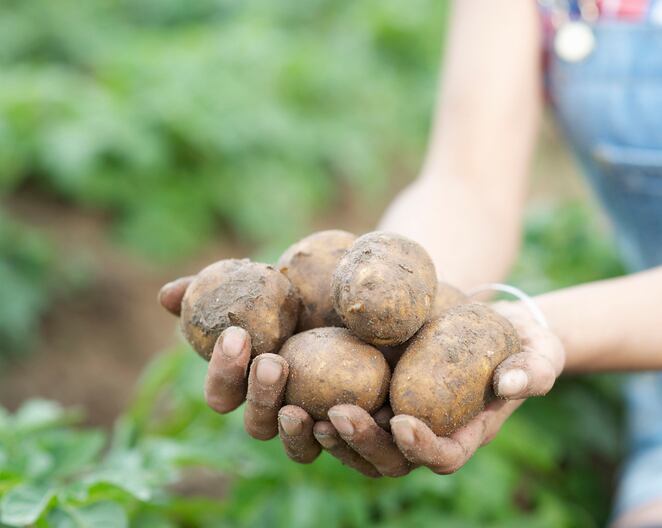Led by agri-tech R&D business B-hive Innovations, the new research project, called TuberGene, is funded as part of UKRI’s National Engineering Biology Programme and aims to harness the power of gene editing to address pressing challenges and secure a sustainable future for the potato industry.
The UK potato sector produces around five million tonnes of potatoes each year but faces significant hurdles, including producing a significant number of potatoes that don’t meet commercial specifications, costing millions of pounds annually. Additionally, changing consumer preferences have caused fresh potato sales to gradually decline, as people opt for quicker-cooking alternatives like rice and pasta.
With new legislation allowing the commercial development of gene edited crops, the project presents an exciting opportunity to transform the industry. Researchers will focus on two key goals: reducing bruising-related discoloration and making potatoes quicker to cook. These improvements aim to enhance potato quality, cut down on food waste, and meet the evolving needs of consumers.
B-hive Innovations is a team of agritech and biotech pioneers bringing innovative processes to the fresh produce supply chain, which has attracted significant support as part of UKRI’s funding initiative. Also part of the scientific team delivering the research are Branston Ltd, the James Hutton Institute and James Hutton Ltd.
Dr. Andy Gill, general manager of B-hive Innovations, said: “The UK potato industry is facing significant challenges, and it’s crucial that we find innovative solutions to ensure its long-term viability. This project represents a major step forward in our efforts to address issues such as bruising-related losses and changing consumer preferences.”
Dr. Rob Hancock, research scientist at the James Hutton Institute, said: “Gene editing and other precision breeding technologies offer unprecedented opportunities to rapidly enhance the traits of potatoes, meeting the need to quickly respond to the changing preferences of consumers. By targeting specific genes responsible for traits like bruising susceptibility and cooking times, we can create varieties that meet the needs of both growers and consumers.”
A key part of the project involves sequencing the genome of the Maris Piper potato, a beloved variety in the UK. This foundational work will pave the way for future targeted gene editing to enhance other desirable traits.
Barbara Correia, principal research scientist at B-hive added: “This project leverages the bioinformatics expertise in our business and the genome sequencing allows us to build a pipeline to address other issues in potato farming, such as disease resistance, as we move towards the creation of a Super Spud. It also means that we can apply our skills more easily to other crops, thereby helping more of the UK’s fresh produce sector and safeguarding global food security.”
Combatting Fusarium Basal Rot in onions
B-hive Innovations has also joined with the British onion sector to develop a pioneering research programme into preventing crop loss from Fusarium Basal Rot (FBR), a devastating infection caused by a soil-borne fungus.
Called ‘FUSED - Integrated fusarium early diagnostic and management’ is a 24-month, £1 million project aiming to define better ways of detecting and managing FBR infection, particularly at the earliest stages of onion production. FBR disease can attribute up to 40% of crop losses for growers, which currently costs the onion industry more than £10 million a year.
Dr. Mercedes Torres Torres, B-hive’s head of machine learning, said: “Our goal is to detect infected onions during growth and at the earliest possible stages, and we are excited by the challenge this brings. We’ll be drawing on our considerable expertise in remote sensing, including use of hyperspectral imaging in agriculture, and are confident that we can find better ways of detecting disease.”


